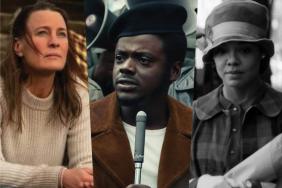The Lodgers: Wildly Gothic horror film is the best movie of its kind since The Others
Last week, we raved about the Gothic, lurid mystery thriller The Limehouse Golem and then, in another feature, championed the return of this sort of cinema by rolling out a list of our 9 favorite — many unsung — Gothic horror movies. In both of those features, we mentioned a picture that we had recently seen and would soon discuss here. That film was Let Us Prey director Brian O’Malley’s Irish chiller The Lodgers, a swooning, sexually-charged and ultra-stylish psychodrama that had its world premiere recently at the 2017 Toronto International Film Festival.
And now, it’s time to discuss it.
The Lodgers tells the tale of haunted, soon-to-be impoverished, twin orphans Rachel (Charlotte Vega) and Edward (Bill Milner) who, in the early part of the 1930s, are literally trapped in their crumbling mansion by an ancient family curse. Said curse — hammered home by a lilting nursery rhyme the siblings sing and that is also lyrically woven into the fabric of the soundtrack — insists that Rachel and Edward must never let any outsiders into the house and must be locked up in their rooms before midnight and never, under any circumstances be separated, lest they face the wrath of the spectral “lodgers” who prowl the corridors at night, keeping an otherworldly eye on them, as they have for generations of their brood before them. And while the sickly, androgynous Edward is committed to this system, he’s becoming more unhinged due to the fact that Rachel is not. Smitten by a local soldier (Eugene Simon) and alternately skeptical and revolted by her situation, Rachel begins to rebel, desperate to escape the oppression and misery of her life and the vitriol of the sneering village locals, who despise the siblings for apparently no other reason outside of the fact they exist.
O’Malley ratchets the tension, beautifully realizing writer/co-composer David Turpin’s gently-disturbing script, with its implications of the taboo, and then pushes the story to wild, hallucinatory heights, employing delirious dream-state, Id-stimulating visuals to exemplify both the states of mind of his doomed characters and an aesthetic distortion of the “secrets” of the movie. These passages are stunning, like Ken Russell’s The Devils by way of Brian Glazer’s Under the Skin, with dripping liquids, black voids, people floating wide-eyed in water (water itself being a character in the film) and a fetishization of Vega’s poreclain-like face. Because the greatest special effect IS the human face, something O’Malley realizes and he lets his camera attach itself to Vega’s big eyes, perfect lips and, in the more phantasmagorical sequences, to her wild, Medusa-like mane of hair. Vega’s Rachel is a classic Gothic heroine and her femininity and burgeoning sexuality and urgent need for independence is the soul of the picture. Again, O’Malley knows this and he makes The Lodgers itself FEEL decidedly feminine.
Like all worthy Gothic horror movies, there’s more than a nod to Henry James’ The Turn of the Screw (and the 1961 film adaptation The Innocents) as well as Bronte Sisters novels like Wuthering Heights and Jane Eyre, with its family secrets, tormented characters and lived-in, haunted feel. And like every great picture in this enduring sub-genre, location is key. The Lodgers sets most of its story within the diseased walls of the siblings’ family home and O’Malley managed to find a real-deal haunted house in Ireland, an unlivable manor (apparently only the caretaker dares to sleep there) that speaks of majesty and opulence gone to seed; a big, broken and beautiful wreck, witness to history and hundreds of years of human folly. It’s a marvelous location and its natural decay mirrors the minds of the innocent yet hopeless Edward and Rachel, especially Edward who has resigned himself to his past and dutifully accepted his grim destiny.
The Lodgers is an almost pornographically Gothic movie. If you adore this sort of stuff — and I most certainly do — you’ll eat every inch of it. There hasn’t been a more effective, disturbing and sensorially pleasing film of this kind since Alejandro Amenabar’s The Others and, like that masterpiece, O’Malley’s artful, lurid and meticulously orchestrated exercise in atmosphere, pretty misery and dread seeps deep under your skin. And it stays there. For keeps.
The Lodgers
-
The Lodgers 1

-
The Lodgers 2

-
The Lodgers 3

-
The Lodgers 4

-
The Lodgers 5

-
The Lodgers 6

-
The Lodgers Finish Key Art











